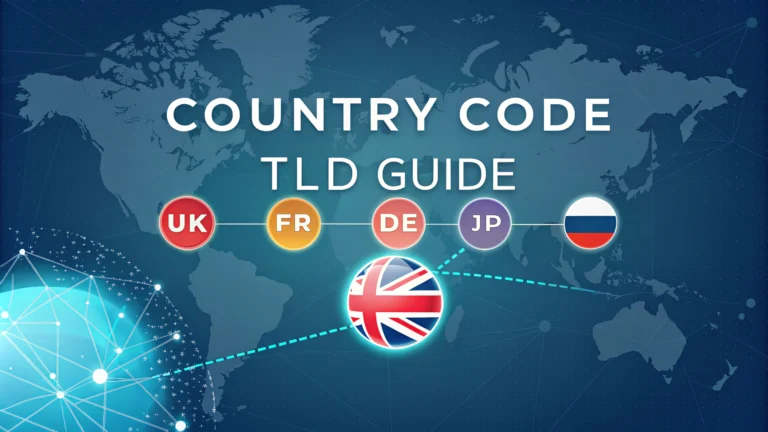Country code top-level domains (ccTLDs) are two-letter internet domain extensions specifically assigned to individual countries or territories.
Each ccTLD represents a unique geographical location, such as .uk for the United Kingdom or .ca for Canada.
The Internet Assigned Numbers Authority (IANA) manages and coordinates these country-specific domain extensions worldwide.
Benefits of Using Country Code TLDs
Businesses targeting specific national markets can gain significant local credibility by using a region-specific domain extension.
Local SEO performance often improves when websites use country-specific domains, signaling geographical relevance to search engines.
Consumers tend to trust websites with local domain extensions, perceiving them as more authentic and regionally connected.
Registration Requirements for ccTLDs
Registration policies for ccTLDs vary dramatically between different countries and territories.
Some countries require local business registration or citizenship, while others have more relaxed international registration policies.
Researching specific country registry requirements is crucial before attempting domain registration.
Popular Country Code TLD Examples
| Country | ccTLD | Notable Characteristics |
|---|---|---|
| United Kingdom | .uk | Strict registration requirements |
| Germany | .de | Most popular European ccTLD |
| Canada | .ca | Open registration policies |
Strategic Considerations for ccTLDs
Selecting the right ccTLD requires careful assessment of business goals and target market demographics.
Multinational companies might consider purchasing multiple country-specific domains to enhance regional marketing strategies.
Domain investors often recognize ccTLDs as potential valuable digital real estate for specific geographic markets.
Technical and Legal Implications
Some ccTLDs have unique technical restrictions or additional security protocols compared to generic top-level domains.
Legal jurisdiction can differ significantly based on the country’s domain extension, potentially impacting website governance.
Understanding these nuanced differences helps businesses make informed domain registration decisions.
Emerging Trends in Country Code Top-Level Domains
The digital landscape of ccTLDs continues to evolve rapidly, with emerging markets showing increased innovation in domain registration strategies. Many developing countries are now viewing their national domain extensions as potential economic assets, creating more flexible and internationally friendly registration policies.
Technological advancements have enabled more sophisticated domain management systems, allowing countries to implement advanced security features and internationalized domain name (IDN) support. This means ccTLDs can now support non-Latin scripts, making them more accessible to diverse linguistic communities.
Blockchain and decentralized technologies are beginning to influence ccTLD management, with some countries exploring more transparent and secure registration methods. These innovations promise to reduce domain fraud and create more robust verification processes for national domain extensions.
Global connectivity has transformed ccTLDs from purely national identifiers to strategic digital branding tools. Businesses and entrepreneurs increasingly recognize these domains as powerful markers of regional expertise and local market understanding.
Economic Impact of Country Code Domains
Country code top-level domains represent significant digital economic infrastructure for many nations. Some countries have successfully transformed their ccTLDs into revenue-generating assets, creating competitive domain registration markets that attract international businesses and investors.
Small nations with strategic ccTLDs have discovered unique monetization opportunities, using their domain extensions as digital branding platforms. For instance, some island nations have marketed their domains as attractive alternatives for international businesses seeking distinctive web addresses.
The economic value of a well-managed ccTLD can extend beyond direct registration revenues. These domains can attract foreign investment, showcase national technological capabilities, and serve as important digital diplomatic tools in the global internet ecosystem.
Economists and digital strategists increasingly view ccTLDs as important indicators of a country’s digital readiness and technological infrastructure. The management and adoption of these domains can reflect broader technological capabilities and international digital engagement.
Conclusion: The Future of Country Code Domains
Country code top-level domains continue to play a crucial role in the global internet architecture, balancing national identity with international connectivity. As digital landscapes evolve, ccTLDs will likely become even more sophisticated, flexible, and strategically important.
The ongoing digital transformation suggests that these national domain extensions will remain dynamic, adapting to technological innovations, changing geopolitical landscapes, and emerging global communication needs. Businesses and individuals must remain adaptable and informed about these evolving digital territories.
While challenges exist, the potential for country code domains to facilitate meaningful digital connections remains profound. They represent more than mere technical addressing systems—they are powerful tools for cultural expression, economic opportunity, and global communication.

